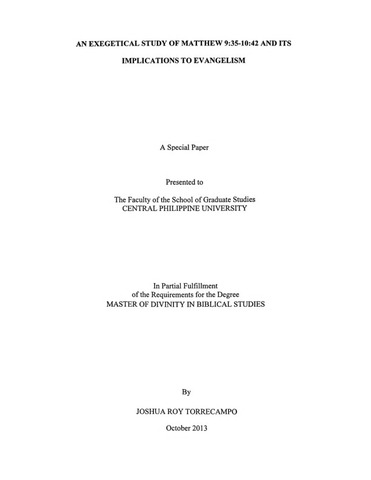An exegetical study of Matthew 9:35-10:42 and its implications to evangelism
| dc.contributor.adviser | Fabula, Nathaniel M. | |
| dc.contributor.author | Torrecampo, Joshua Roy | |
| dc.date.accessioned | 2021-03-30T00:23:35Z | |
| dc.date.available | 2021-03-30T00:23:35Z | |
| dc.date.issued | 2013 | |
| dc.identifier.citation | Torrecampo, J. R. (2013). An exegetical study of Matthew 9:35-10:42 and its implications to evangelism (Unpublished Master's special paper). Central Philippine University, Jaro, Iloilo City. | en_US |
| dc.identifier.uri | https://hdl.handle.net/20.500.12852/696 | |
| dc.description | Abstract only | en_US |
| dc.description.abstract | This is a descriptive type of research that utilizes the exegetical method. It is the drawing out of the meaning of the studied text. This study made use of exegetical tools like commentaries, theological dictionaries, and books that are available in the library. This study aimed to interpret Matthew 9:35-10:42 and reflected on its implications to evangelization in today’s context. It intended to determine a method towards evangelism and specifically to define missions based on the studied text, and come up with missions strategy that corresponds with the culture of the people. Missions in this account is defined as the response to the present condition of the people and their need, and this need is the connection of Jesus with the people. In order to respond to the need of the people, compassion is needed. The legitimate response to the ‘deep hunger’ of the people is to have the authority from Jesus. Partnership is very important in missions. The discipline of the one who has the authority from Jesus to address the deep hunger is to live a simple life, endure sufferings (self-denial), and have wisdom, pure and clean motive. Missions should be in accordance with the culture of the people. The readiness of the people for ‘harvest’, is marked by their hospitability. The overriding principle is: Those who reject the disciples also reject Jesus and those who accept the disciples accept Jesus. Reward is a plus factor to those who do the mission and to those who extend hospitality. | en_US |
| dc.format.extent | v, 56 leaves | en_US |
| dc.language.iso | en | en_US |
| dc.rights | Attribution-NonCommercial-NoDerivs 3.0 Philippines | * |
| dc.rights.uri | http://creativecommons.org/licenses/by-nc-nd/3.0/ph/ | * |
| dc.subject.ddc | TheoLib Thesis 207.2 T635 | en_US |
| dc.subject.lcsh | Bible. Matthew | en_US |
| dc.subject.lcsh | Bible. Matthew--Commentaries | en_US |
| dc.subject.lcsh | Bible--Commentaries | en_US |
| dc.subject.lcsh | Evangelistic work | en_US |
| dc.subject.lcsh | Missions | en_US |
| dc.title | An exegetical study of Matthew 9:35-10:42 and its implications to evangelism | en_US |
| dc.type | Special paper | en_US |
| dc.description.bibliographicalreferences | Includes bibliographical references | en_US |
| dc.contributor.chair | Pagara, Bernabe C. | |
| dc.contributor.committeemember | Villeza, Rea Angelica F. | |
| dc.contributor.department | School of Graduate Studies | en_US |
| dc.description.degree | Master of Divinity in Biblical Studies | en_US |



